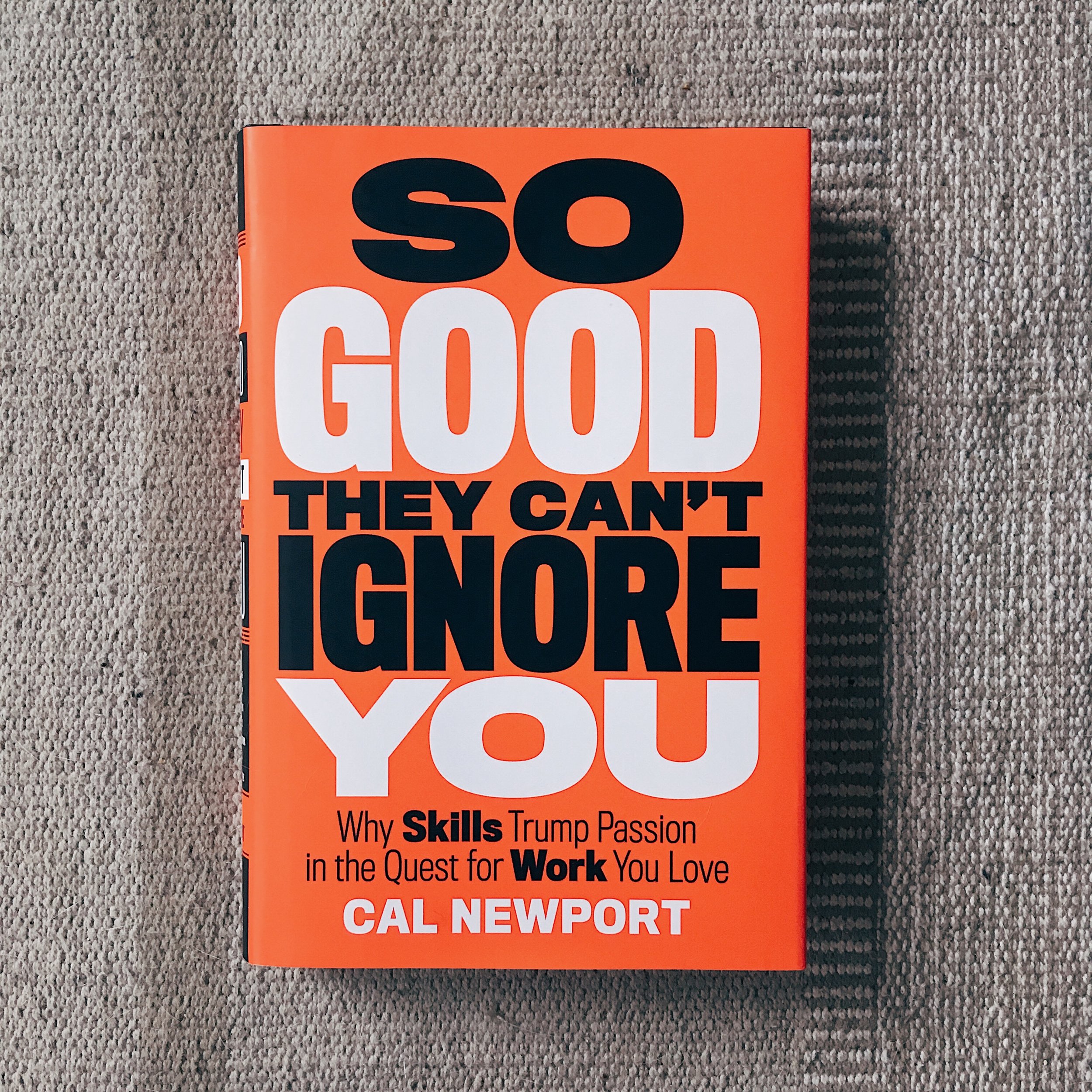So Good They Can’t Ignore You by Cal Newport
The Book in Three Sentences
Don’t make the mistake of thinking big, looking for a world-changing mission without the career capital to back it up or you’ll get stuck making little progress. If you just show up and work hard, you’ll soon hit a performance plateau and fail to get any better. Developing work you love means patiently building ‘Career Capital’ (rare and valuable skills) towards a tentative mission through deliberate practice.
Notes on the Book
Cal Newport’s writing is filled with illuminating case study examples of the concepts he suggests. This is further backed up with statistics and parallels he draws to other ‘big thinkers’ of our era.
If you can only spare 5 minutes, read Newport’s incredible Glossary that defines all the key terminology in his book. It’s essentially the whole book boiled down to 7 pages! (pp231–237).
Rule 1: Don’t [Blindly] Follow Your Passion
The Passion Hypothesis
Career passions are rare. (p14)
The key to occupational happiness is to first figure out what you’re passionate about and then find a job that matches. (p4)
Passion takes Time
Passion is a side effect of mastery. (p17)
The happiest, most passionate employees are not those who followed their passion, but rather those who have stuck around long enough to become good at what they do. (p17)
Amy Wrzensniewski differentiates between a job, a career, and a calling. Job: a way to pay the bills. Career: a path toward increasingly better work. Calling: work that’s an important part of your life and identity. Newport refers to a similar concept of ‘calling’ later in the book as your ‘mission’. (p15)
Self-Determination Theory
SDT outlines three basic ingredients that motivate workers:
Autonomy — feeling like your actions matter
Competence — feeling good at what you do
Relatedness — connection to others
Rule 2: The Importance of Skill
The Craftsman Mindset
Abandon the passion mindset (what can the world offer me) and instead adopt the craftsman mindset (what can I offer the world). (p42)
The craftsman mindset takes the position of deliberately practicing and honing one's skills (introduced on p37).
Where you can’t apply the craftsman mindset, it’s probably a sign to leave your job. Three dis-qualifiers for applying this mindset to your job:
Few opportunities to distinguish yourself by developing relevant skills that make you rare and valuable.
Focuses on something you think is morally wrong, useless, or actively bad for the world.
The job forces you to work with people you really dislike.*
* I personally find rule three to be weak. You’re never going to like everyone and this should be a good opportunity to be the stronger person and work through it.
Deliberate Practice
In a 2005 study of over 400 chess players led by Neil Charness examined why after 10,000 hours of practice some people became grandmasters while others remained at an intermediate level. Researchers discovered that the grandmasters dedicated 5x more hours to serious study. Of the 10,000 hours, they devoted nearly 5,000 to things like working with an expert coach to receive immediate feedback. (pp81-83)
The lesson from the above study is that if you just show up and work hard, you’ll soon hit a performance plateau beyond which you fail to get any better. (p85)
Breaking past this plateau requires deliberate practice. There are two parts to define deliberate practice: (1) pushing past your comfortable normal, and (2) embracing honest feedback.* (p97)
*I would argue designers and architects are particularly good at this.
Career Capital
You need to build rare and valuable skills, which Newport defines as ‘Career Capital’. This is the foundation of constructing work you love. You apply the craftsman mindset to hone these skills. Getting better requires the strain of deliberate practice and thinking craft-centric. (p100, 215)
Rule 3: Turn Down a Promotion
“Finding the right work pales in importance to working right.” (p108)
The Irony of Control
When no one cares what you do with your working life, you probably don’t have enough career capital to do anything interesting. (p130)
The Law of Financial Viability
Use money as a neutral indicator of value, determining whether or not you have enough career capital to succeed with a new pursuit. In this case, you want to pursue skills that people are willing to pay you for. (p143)
Rule 4: The Importance of a Mission
Don’t make the mistake of thinking big, looking for a world-changing mission without the career capital to back it up or you’ll be stuck making small, ineffectual acts. Instead, focus on patiently building rare and valuable skills and your mission will become more obvious and attainable. (p167)
Make Methodical ‘Little Bets’
You don’t have to start with a big plan or project in advance. Instead, make a series of methodical little bets* about what might be a good direction. This gives you the opportunity to learn from lots of little failures and small (but significant) wins giving you rapid feedback. (p179) *This idea adapted from Peter Sims.
For a project to be a success, it must be remarkable in two ways: (1) literally compel people to remark about it, and (2) launched in a manner conducive to such remarking. Newport’s ‘Law of Remarkability’. (p197)
Building Your Own Mission
You Missions require two things: (1) career capital, which requires patience; and (2) awareness of the cutting edge in your field and constantly looking for new combinations of ideas. (p223)
A mission is a lifestyle, not a series of steps to achieve a goal. (P223)
Top Level: The Tentative Mission
A rough guideline for the work you’re interested in: i.e. “To apply theory x to interesting new places with the goal of producing interesting results.” (p223)
Middle Level: Exploratory Projects
This is where you take little bets:
Small enough to be completed in less than a month*,
Forces you to create new value like mastering a new skill,
Produces a concrete result that you can use to gather concrete feedback. (p225)
*Tim Ferris often states he lives his life in a series 2-week experiments and 6-month increments at a time. These short ‘experiments’ function to gauge your excitement.
Bottom Level: Background Research
Expose yourself to something new in/about your field. Read a paper, attend a talk, schedule a meeting, etc. Ensure you understand this new idea by making a diagram or writing a short summary in your own words. (p224)
Key Actionable Ideas
Hour Tracking Strategy
Cal Newport tracks the hours he spends each month dedicated to thinking about core problems (research problems in his case). “The hour-tracking strategy helped turn my attention back to the quality of what I produce”. (p35, 213–214)
Align your Efforts with Your Goals
Make your life more intentional. Schedule your week in the 30-minute parts, allocating specific amounts of time to tasks. “I spend time on what’s important, instead of what’s immediate.” (p89) Example:
Hard to Change Commitments
Email — 7 hours
Lunch and Breaks — 4 hours
Planning and Organization — 1.5 hours
Flexible Commitments
Design Research — 4 hours
Networking and Professional Development — 3 hours
Fundraising Process — 2 hours
Calls with Potential Clients — 1.5 hours
And restrict the hours on tasks that don’t make you better at what you do!



